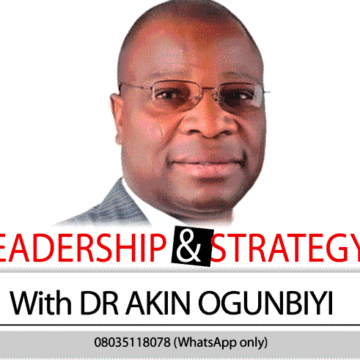Corporate reputation is usually defined as perception of the performance of an organisation or “brand halo effect” of a company’s performance.
It is the intangible asset that drives value for high performance. If we use the resource-based model (RBV) to analyse superior performance or sustainable competitive advantage, the deduction usually is that it is the result of interaction of strategy, tangible and intangible resources to create value.
Different organisations have different resources or resource heterogeneity. The ways these resources are managed create diversity that delivers competitive advantage.
Individual organisations must, therefore, keep working hard to achieve good reputation, keep affirming it and keep creatively building on it.
However, my task today is a wake-up call to business leaders that in turbulent and challenging markets, reputation and resilience are critical ingredients for survival.
In the convulsive context in which we are doing business in Nigeria presently, reputation will definitely provide the protective and predictable environment we need to compete and thrive.
Results of recent research by Harvard Business Review (HBR) revealed that reputation, like resilience, is “an organisation’s ability to overcome unexpected shocks because it strategically throws-up three things; namely: notions of prominence, perceived resilience in turbulent situations and a cluster of high quality attributes and emotions that customers, employees and even regulators, associate with.” According to the HBR report, reputation assures customers that the organisation will be around tomorrow. So you can invest time, energy and money in it.
Excellent corporate reputation exudes stability with an enduring and extremely important assurance to employees, stakeholders and partners.
A resilient reputation shows that the organisation “will never allow the rug to be pulled out under her feet even when the environment is unpredictable and uncertain. Reputation, a huge asset, confirms the strength of an organisation in a consistent manner.
This asset delivers stability in good and even challenging environments. It reminds organisations to constantly keep up their authenticity and high standards (especially ethical standards) in order to remain competitive.
Beautiful stories of antecedents of beneficial values allow organisations to enjoy transactional confidence. It is also a reliable shock absorber for avoidable mistakes. In addition, it is a strategic tool in the hand of business leaders because reputation helps negotiations and competitive decision-making. Reputation “pays dividends” because owners and employees must always uphold valuable traits like honesty and integrity.
It is worthy of note that few strategic constructs can work in good and bad times like reputation. HBR says “favourable reputation allows an organisation to overcome and capitalise on uncertainty. Reputation has offensive and defensive properties and it is very valuable during positive and negative economic cycles. It takes a long time to build it and can be hugely damaged by a single accident.”
Allison Kruger, lecturer at Stanford Graduate School of Business, describes resilient reputation as a signal of how you lead and a critical asset that “precedes you into a room and remains behind after you leave.” She described reputation as “a trust radar that gets passed-on to the primary, secondary and tertiary audiences.” She listed the “four axes” of the trust radar as: empathy and accountability, transparency, expertise and commitment.
Jonathan Lowe and Pam Cohen Kalafut gave us another perspective of corporate reputation (not resilient reputation) in their book titled, ‘Invisible Advantage.’ Corporate reputation is defined as “the most enduring and lasting asset” of an organisation. It is the ultimate intangible that showcases how “an organisation is perceived by a variety of people” but it is slippery, volatile, amorphous and can be compromised.”
We must, on a continuous basis, take stock of corporate reputation, “count on it, take charge of it, take action on it and communicate it.” Corporate reputation captures the values that resources create and appropriately communicates them through public relations, consumer endorsements and brand association with resilient organisations. It confers competitive superiority through feelings and emotions. Distinctive competencies draw patronage instead of qualitative and analytical data.
The authors noted that different stakeholders are always asking themselves: “what organisations do you most admire?” Also, reputation gives employees choices on where they work even when the economy is challenged. An organisation’s ability to attract capital depends on it. Customers also like to do business with organisations they respect. Good reputation helps attract talented employees, profitable customers, collaborative partners and value-adding investors.
Corporate reputation therefore, adds greater value than proprietary know-how, intellectual property, workforce skills, supply networks and combines effectively with brand equity. As we all know, the brand interacts dynamically with financial performance and therefore, definitely and positively affects the numbers or profitability.
Let me conclude by reiterating the need for business leaders to rely and make the best use of adaptive skills in these challenging times. Let us counterbalance challenges, jump over obstacles and fall back on protective experiences and supportive strategies.
No matter the headwinds, we must move forward with transformative innovation. We can increase market share and business growth with entrepreneurship and strategically utilise possibilities and opportunities being thrown-up every day. Our well-known resourcefulness and active skill-building activities must be foundational to our business strategies and also serve as the reliable bedrock of resilience.
Resilient reputation will definitely see us through these trying times. We will overcome expected and unexpected shocks and innovate our organisations successfully for long-term business success.
WATCH TOP VIDEOS FROM NIGERIAN TRIBUNE TV
- Let’s Talk About SELF-AWARENESS
- Is Your Confidence Mistaken for Pride? Let’s talk about it
- Is Etiquette About Perfection…Or Just Not Being Rude?
- Top Psychologist Reveal 3 Signs You’re Struggling With Imposter Syndrome
- Do You Pick Up Work-Related Calls at Midnight or Never? Let’s Talk About Boundaries







